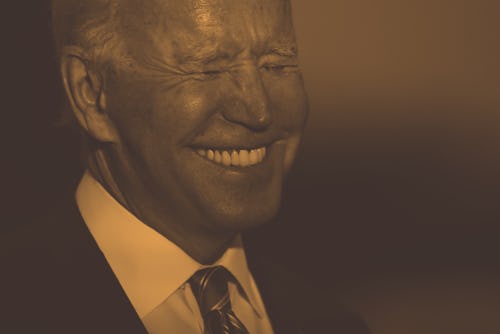Joe Biden very politely told Donald Trump to take his executive privilege and shove it
Awww poor baby.

If there’s one thing former President Donald Trump loved about his time in the White House it was pardoning turkeys. But if there was a second thing he loved about being the most powerful man in the world, it was being able to look at just about any legal challenge to even his most brazen crime-doing and say neener neener neener, I’ve got executive privilege, so go kick rocks.
Alas, all good things famously come to an end — or in the case of Trump’s beloved executive privileges, are actively ended, with the White House officially stepping in on Friday to tell its former occupant that the jig is up.
In a memo to the National Archives, the Biden Administration formally declined to extend any sort of executive privilege protections to Donald Trump, who is trying to avoid turning over documents from the waning days of his administration to the House Committee investigating the January 6 attempted coup. Instead, White House Counsel Dana Remus explained in the note, “President Biden has determined that an assertion of executive privilege is not in the best interests of the United States, and therefore is not justified as to any of the documents.”
The decision not to acquiesce to this ex-post-facto assertion now sets up a three-way clash between Trump, Biden, and the bi-partisan January 6 commission, which has also been rebuffed by former Trump advisor Steve Bannon — reportedly under instructions by Trump himself — who claimed his ex-boss’ now-denied executive privilege protections extended to him, too. Unfortunately for Trump (and Bannon, and anyone of his other goons hoping to shield themselves under the protective wings of executive privilege) the law is fairly straightforward on the question. As former Obama White House Counsel and Harvard Law professor Neil Eggleston explained just last month:
[U]nder our system, the authority attaches to the office, not the human. President Biden has this power because he’s president, not because he’s Joe Biden. And when President Trump was in office, he had the power because he was President Trump, not because he was Donald Trump. So, I think the law is pretty well settled.
However, Eggleston cautioned, if Trump were to file a lawsuit against Biden, and that suit were to make it all the way to the current, deeply conservative Supreme Court, it’s anybody’s guess whether the existing precedent would stand. With that in mind, it seems likely that Trump’s assertion of executive privilege is as much intended to run out the clock on the congressional investigation as it is to actually block the National Archive from turning over the requested documents. And should the issue be tied up in litigation through the coming midterm election, and if Republicans do regain control of the House ... well, it’s easy to see how Trump could easily lose the specific battle, but still win the overarching war.
For Bannon, whose assertion of executive privilege by proxy is somewhat complicated by the fact that he wasn’t even working at the White House at the time investigators are looking at, there could be even more immediate consequences for ignoring the congressional subpoena; in a statement released by committee co-chairs Benny Thompson and Liz Cheney, the pair note that while they welcome “good-faith engagement” from witnesses, “we will not allow any witness to defy a lawful subpoena or attempt to run out the clock, and we will swiftly consider advancing a criminal contempt of Congress referral.”
Put another way: go kick rocks.